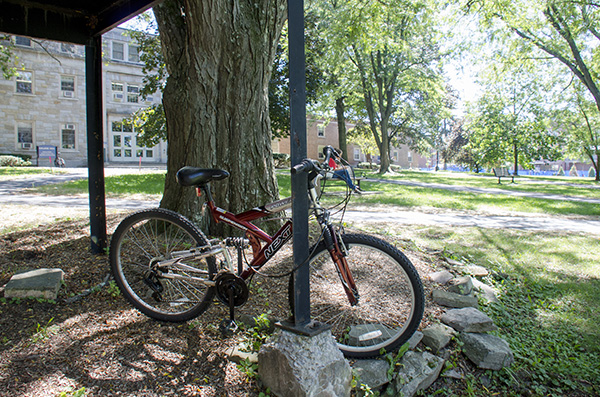

The SUNY New Paltz Sustainability Committee met Tuesday, Nov. 19 to discuss issues and goals related to the campus bicycle policy.
Released in mid-September, the campus bike policy states bicycles locked to areas other than the designated bicycle racks, such as lamp posts or railings, will have their chains or locks cut and be relocated to the nearest bike rack by a member of Campus Facilities if the owner cannot be identified or if their bike is registered with the school and does not respond to a call from Facilities staff.
The relocated bikes are to be fitted with a temporary lock that Facilities will unlock upon the bike owner contacting them and proving ownership of the bike.
However, this specific clause within the policy has yet to go into effect, according to Co-chair of the Sustainability Committee Lisa Mitten.
The meeting, attended by Sustainability Committee members as well as some concerned students, faculty and town residents, focused on the issue of cutting the locks of improperly stowed bicycles – discussing its justifications, why bikes are being improperly stowed and what to do about it.
Student and member of the New Paltz Bicycle and Pedestrian Committee Ari Kaputkin said the 88 bike racks listed in the bike policy outreach email sent to campus in mid-September, which has increased to 91 racks since then, provided an inadequate number of bike parking spaces to satisfy student needs, particularly in the area of the classroom buildings – Humanities, Lecture Center, Sojurner Truth Library and Coykendall Science Building – where the highest amount of improperly stowed bikes on campus were observed.
The meeting began with attendees listing their goals for biking on campus. Committee members quoted language from the Sustainability Committee developed 2012 SUNY New Paltz Campus Sustainability Plan and its goal of reducing the New Paltz college campus’ carbon dioxide emissions and creating a more energy efficient environment through the promotion of “green” policy implementation.
Specifically highlighted was the Sustainability Plan’s section on Transportation Action that looks to lower carbon emissions by advocating biking and bike culture on campus through the proposed creation of a bike share program and the installation of bike racks near every campus building.
The committee started the bike policy discussion deliberating on the reasons why some students choose to improperly park their bikes outside of bike racks. The number of bike racks was questioned — as well as the convenience of location of bike racks for students.
Mitten posed a question to the committee to be addressed if change was to be pursued.
“I put this to the group,” Mittend said. “How can we institute rules about biking and also promote a bike culture at the same time?”
Kaputkin created a map of campus where bike racks are located and the number of parking space they provided. He estimated that only around 50 to 70 percent of the 600 bike parking spaces available on campus provided natural accommodation when racks were fully utilized, meaning that given the various size, shape and orientation of different bikes, it created a physical space discrepancy between the amount of bikes the racks are thought to allow parking for.
Kaputkin said that according to the League of American Bicyclists’ critique of campuses for bicycle infrastructure, the minimum suggested ratio for undergraduate students to bike racks is 1:4. New Paltz’s ratio is 1:11. Given the numbers, Kaputkin said it made sense that bikes were being improperly parked.
“[There are] about 600 spots to 6,685 students,” Kaputkin said.
Kaputkin said he would like to set up a time-lapse camera outside of the Jacobson Faculty Tower area to gather incremental data on whether the bike racks were being filled and at what times did they reach capacity.
Co-chair of the Sustainability Committee KT Tobin suggested postponing the lock cutting, and said that if the campus could not provide the necessary means for students to act in accordance with the bike policy, it was unfair to punish them for not following it.
“It seems to me that the question is do we really have what we need,” Tobin said. “You can’t put a punitive reaction in place unless the structure allows for students to behave the way you want them to behave.”
The committee also called to attention the fact that the construction of new residence halls like the proposed Park Point apartments and the residence hall to be build behind Lenape Hall would lead to the need for more bike racks, particularly at Park Point, due to its location on Route 32 making students more likely to bike to campus. The use of bicycles by students currently living off campus to travel to class was also mentioned.
Chair of the Department of Sociology and Sustainability Committee member Brian Oboch drafted a recommended course of action. It states that bike lock cutting be suspended unless they egress safety until the bike policy can be reviewed. It also stated that an ad-hoc policy sub-committee be created to gather and analyze data, that the sub-committee be composed of volunteers appointed by the sustainability committee and representatives from facilities management.
The motion was passed by voting sustainability committee members to be given to the Budget Goals and Plans Department.
